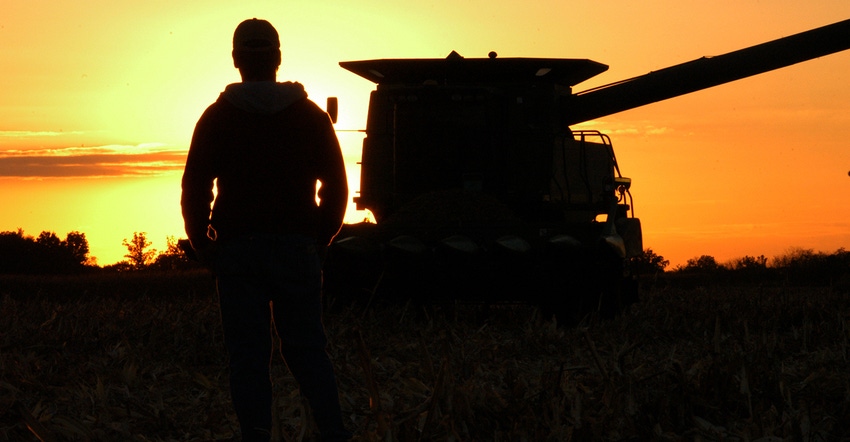
“There is a lot of stress involved in farming,” according to Tammi Kohlman, Comprehensive Service Integration of Fond du Lac County Destination Zero coordinator. She spoke to more than 100 ag lenders and other agribusiness professionals attending a workshop about supporting farmers during challenging times on Jan. 9 in Kiel, Wis. “Farming in good times is stressful,” she pointed out.
But those working with and living with farmers need to watch out for signs of chronic stress in farmers. Many are struggling with the fifth year in a row of low milk and commodity prices, and are having trouble paying bills, feeding their livestock, buying crop inputs and even putting food on their tables.
If a farmer used to be on time with everything and suddenly, he or she isn’t, that is a sign, Kohlman explained.
“If they have an increase in illnesses or accidents, or you used to be able to joke around with them and now they are somber, those are clues that they are dealing with chronic stress,” she said.
Chronic stress
Other signs of chronic stress include:
• backaches
• sleep disturbances
• sadness
• anger
• irritability
• increased use of alcohol
• inability to make decisions
• doubting abilities
• decline in the appearance of the farmstead
• decline in the care of livestock
“People dealing with chronic stress become more anxious, have headaches, memory loss, feelings of failure and withdrawal,” Kohlman said. “At this point, intervention is necessary.”
Recognize that negative self-talk is happening, Kohlman said, and make a conscious effort to reframe it.
“Talk openly with family members,” she explained. “A lot of times people will clam up — they don’t want to burden anyone. It’s hard for some people to talk about what’s wrong. A common response is to withdraw.”
Why talk about suicide?
Kohlman said overall suicide rates are increasing. In 2017, more than 47,000 people died by suicide in the U.S., including 915 people in Wisconsin.
“These numbers are only those deaths that were officially ruled suicides,” Kohlman said. “There are many suspicious accidents that may have been suicides, but we’re not sure.”
Suicide in Wisconsin is the highest it has ever been, she said, and suicide rates in the eastern Wisconsin counties of Calumet, Fond du Lac, Manitowoc, Sheboygan, Washington and Ozaukee have been higher than the average rate of suicide in Wisconsin four out of the last five years. And they have skyrocketed in rural areas. Kohlman noted the following facts:
• Nearly four times as many men die by suicide as women.
• Males ages 45 to 64 have suicide rates double that of the general population.
• Many more people attempt or contemplate suicide than die from suicide.
“Suicide rates among farmers are higher than the general population,” Kohlman said. She said farmers are more prone to suicide because they:
• lack control over weather, prices, regulations and policy
• are independent, which adds pressure
• have limited access to mental health services
• are reluctant to seek help
• have a “farm comes first” mentality
• have access to lethal weapons
Warning signs
If someone says, “I wish I were dead,” that is a direct clue that they are contemplating suicide, Kohlman said. Other signs include: obtaining a gun or pills, putting affairs in order, giving away possessions, experiencing unexplained anger or aggression, experiencing alcohol or drug abuse/relapse, and withdrawing from activities.
Dispelling myths about helping
Kohlman said many people falsely believe asking about suicide will give a person the idea or make them mad.
“That’s not true,” she said. “This is not the first time someone in deep, emotional stress has thought about suicide. Talking about suicide will not ‘plant the idea’ or trigger suicidal behavior. Let them know that someone else is there.”
Other people may believe that “if their mind is made up, there’s nothing I can do to help.”
“That’s not the case,” Kohlman said. “Heightened suicide risk is often short-term and situation-specific. Most suicidal individuals want to end the pain they are in, not their lives. Reducing their access to lethal weapons saves lives.”
Some believe they shouldn’t say anything because they are not a mental health professional.
“We all have a role to play in preventing suicides,” Kohlman said. “The role a lot of you have is being a gatekeeper. Those who interact with individuals on a regular basis are often in the best position to notice and respond to someone in emotional distress.”
Kohlman said anyone can be the one to:
• Ask.
• Keep them safe.
• Be there.
• Help them connect.
• Follow up.
“It takes courage and strength to ask for help,” Kohlman said. “It’s possible things will turn out better than you ever thought. Speak up.”
To reach the National Suicide Prevention Lifeline, call 800-273-8255. Most counties have suicide hotlines, or call 911.
To talk to Wisconsin Farm Center individuals who can assist you by answering your questions and guiding you in the right direction, call the center at 800-942-2474 between 7:45 a.m. and 4:30 p.m. Monday through Friday.
About the Author(s)
You May Also Like






